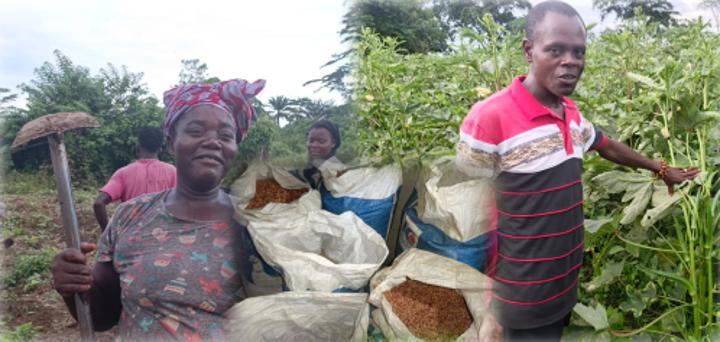Africa-Press – Liberia. Amid rising food insecurity, soaring youth unemployment, and a heavy reliance on imported vegetables, one Liberian-owned farm is rewriting the narrative from the ground up. SANKOFA Farm, tucked away in the heart of Bong County, is quietly fueling a grassroots agricultural revolution—merging ambition, resilience, and smart partnerships to transform Liberia’s food future.
Founded in 2014 by agricultural visionary Nyamah G. Dunbar, the farm has grown from a small cassava patch into the nation’s largest vegetable-producing enterprise, cultivating over 350 acres of a 650-acre expanse.
From Bush to Breakthrough
“We started with seven men, cutlasses, and no machines—just faith,” Dunbar reflected. “We planted cassava in Margibi because Palala was too remote. But we never gave up.”
That perseverance bore fruit—slowly but steadily—despite limited infrastructure and zero institutional backing in the early years. A turning point came in 2022–2023, when the Ministry of Agriculture and the Liberia Agriculture Commercialization Fund (LACF) stepped in with targeted support.
Government Boost Sparks Transformation
LACF’s strategic intervention changed everything. With funding focused on mechanization, farm inputs, and marketing infrastructure, SANKOFA Farm scaled its operations. A tractor enabled quicker land preparation. Certified seeds and fertilizers boosted yields and crop quality. And the construction of a flash-cooling and sales center in Omega, outside Monrovia, slashed post-harvest losses.
“Before, we’d haul our harvest to Monrovia and get stuck at Gobachop,” Dunbar said. “Now, the cooling center preserves our value and strengthens our market position.”
Funds were disbursed transparently, with the Ministry paying equipment and infrastructure providers directly under strict audits.
Fields of Plenty: A Diverse Crop Mix
Today, SANKOFA grows a variety of high-demand vegetables—tomatoes, peppers, cabbage, lettuce, carrots, cucumbers, okra, corn, bitter ball, watermelon, beans, and cassava. Prioritizing quality, the farm imports seeds from the Songhai Institute in Benin due to unreliable local sources.
“Too many farmers suffer from fake seeds,” said Dunbar. “We must decentralize food value. Why should everything head to Monrovia? Let counties like Bong and Nimba develop strong local markets.”
Mechanized Growth, Thanks to Expertise
The farm’s progress is also credited to technical lead Kousse Mamidou, a Beninese agriculturalist who joined the project in 2013 and took charge in Kpai District in 2018.
“Back then, it took weeks to clear land manually,” Mamidou said. “Now, with the Ministry’s tractor and power tiller, we do that in hours.”
Additional support includes solar irrigation systems, sprayers, plastic mulch, and certified planting material. One okra plot alone now yields over 2,000 pounds per week—sold at 300 LRD per pound.
Growing People Alongside Crops
Beyond its crops, SANKOFA serves as a training hub for youth, women, and students—particularly from Booker Washington Institute (BWI) and nearby communities.
“We teach tractor operation, organic methods, and composting. Participants earn certificates and skills they can use,” said Mamidou. Each training cycle reaches between 25 to 45 people, many of whom later secure seasonal or permanent employment.
Real Voices, Real Impact
At SANKOFA, the true transformation is seen in the lives of its workers:
Annie Connor: “We don’t want our boss to give up. The farm helps us survive.”
Betty George: “Many of us women raise our children alone. Our wages feed them. We just ask for boots and raincoats.”
Saye Kerkulah: “I use my pay to help my parents. The soil has money—if you work.”
Joe Sumo (Gbarnga): “The knowledge we get here, we carry back home. Young people need to embrace farming.”
Persistent Challenges
Despite major strides, hurdles remain:
• Poor rural roads and high transport costs
• Inadequate cold storage outside Monrovia
• Limited mechanized tools
• Fake seeds flooding the market
• Middlemen distorting prices
Dunbar emphasized that the government’s role should shift from doing everything to enabling innovators. “Let’s support those already working on solutions. The private sector needs the right policy environment.”
A Call for Deeper Investment
Looking ahead, Dunbar urges the Ministry of Agriculture and partners to scale up their support. “We’ve proven what’s possible with just a little help. Now we need tractors, training, and infrastructure to expand.”
Key Recommendations to MOA
To scale Liberia’s agricultural future, SANKOFA proposes:
• Build decentralized storage and market centers in Bong, Nimba, and Margibi
• Improve seed regulation and importation, reducing access to fake seeds
• Expand farmer training initiatives through institutions like SANKOFA
• Strengthen extension services for technical support and post-grant monitoring
• Invest in rural agro-processing to reduce dependence on Monrovia markets
SANKOFA as a National Model
SANKOFA Farm is more than a successful agribusiness—it’s a working model for food sovereignty. In a nation where, imported lettuce and tomatoes dominate, SANKOFA shows that Liberia can grow its own.
“Our land is rich. Our youth are willing. With the right support, we can feed ourselves,” said Mamidou.
And as one farmworker put it: “Little is much when God is in it.”
This story is part of a special series spotlighting innovation and resilience in Liberia’s agricultural transformation.
For More News And Analysis About Liberia Follow Africa-Press






